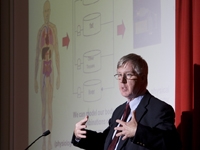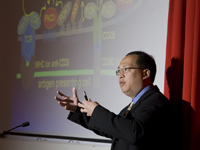
Michael Shuler, Ph.D., the Samuel B. Eckert Professor of Chemical Engineering and the James M. and Marsha McCormick Chair of Biomedical Engineering at Cornell University, speaking at the Symposium on Nanomedicine, Sept. 24.
While the ultimate goal of miniaturizing Dennis Quaid and injecting him into patients to zap away all that ails them remains maddeningly beyond our grasp, the use of nano- and micro-fabrication tools and techniques for both clinical and basic life research has made great strides in recent years.
Medical diagnostics, drug delivery systems and in vivo imaging have all benefited from this nanoscale technology, interventions that work on an atomic and molecular scale.
Cornell University in Ithaca has long been a leader in this field, establishing in 1977 the Cornell NanoScale Science and Technology Facility, a full 10 years before the Quaid film "Innerspace" would raise the idea of shrinking a human being down to micro size.
The facility is one of the largest and most active in the world. And now it will have a permanent presence at Weill Cornell Medical College campus with the recent opening of a remote office to aid students, postdocs and faculty in developing projects in the area of nanomedicine.
On Wednesday, Sept. 24, the Symposium on Nanomedicine was held at Weill Auditorium to celebrate the facility's opening and present the latest research and developments in nanomedicine.
"The recent symposium highlights the potential that intercampus collaborations using nanotechnology offers to our faculty at the Medical College," said Dr. Caren Heller, assistant dean for intercampus initiatives and assistant professor of public health at Weill Cornell. "It can be useful for biomedical research and medical applications, including developing diagnostic devices to detect biomolecules and pathogens; developing prosthetic devices, such as an artificial retina; and research into cell-to-cell interactions and signaling, to name only a few."
The Cornell NanoScale Facility at Weill Cornell Medical College supports a broad range of nanoscale science and technology projects by providing state-of-the-art resources coupled with expert staff support. It will be led by George Malliaras, Ph.D., the Lester B. Knight Director of Cornell NanoScale Science and Technology Facility, and an associate professor in the Department of Materials Science and Engineering at Cornell University.

Lance Kam, Ph.D., assistant professor of biomedical engineering at Columbia University and guest lecturer at the Symposium on Nanomedicine.
"Nanotechnology is limited right now only by our imaginations," Malliaras said of the developing field. "The office at Weill Cornell is meant as a place in which consultation and initial device design will take place."
Beth Rhoades, Ph.D, life sciences liaison, and Michael Skvarla, user program manager, will serve as the facility's on site managers.
The fabrication of devices will still be handled in Ithaca.
The symposium included poster presentations, as well as lectures from Michael Shuler, Ph.D., the Samuel B. Eckert Professor of Chemical Engineering and the James M. and Marsha McCormick Chair of Biomedical Engineering at Cornell University, and Lance Kam, Ph.D., assistant professor of biomedical engineering at Columbia University.
The Cornell NanoScale Facility is staffed by 22 scientists and technicians, whose expertise range from physics to microbiology. Their mission is to lower any barriers to the adoption of nanotechnology techniques by the medical community. About half of the facility's users come from outside Cornell, including multinational corporations.
Shuler remarked upon the staff's ability to fabricate a tool or device to further a specific research goal. "If you can draw it, they can make it," he said.
Photography by Lindsay France.
